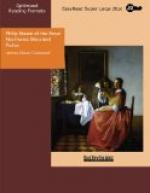Breed’s face brightened in an instant.
“That might save us, Steele. Will you do it?”
“With pleasure.”
Philip was conscious of an increasing warmth in his face as he bent over his plate. “You’re sure—they’re elderly people?” he asked.
“That is what MacVeigh wrote me from Churchill; at least he said the colonel was an old man.”
“And his wife?”
“Has got her nerve,” growled Breed irreverently. “It wouldn’t be so bad if it was only the colonel. But an old woman—ugh! What he doesn’t think of she’ll remind him of, you can depend on that.”
Steele thought of his mother, who looked at things through a magnifying lorgnette, and laughed a little cheerlessly.
“I’ll go out and meet them, anyway,” he comforted. “Have Jack fix me up for the hike in the morning, Breed. I’ll start after breakfast.”
He was glad when supper was over and he was back in his own cabin smoking his pipe. It was almost with a feeling of shame that he took the golden hair from his wallet and held it once more so that it shone before his eyes in the firelight.
“You’re crazy, Phil Steele,” he assured himself. “You’re an unalloyed idiot. What the deuce has Colonel Becker’s wife got to do with you—even if she has golden hair and uses cream-tinted paper soaked in hyacinth? Confound it—there!” and he released the shining hair from his fingers so that the air currents sent it floating back into the deeper gloom of the cabin.
It was midnight before he went to bed. He was up with the first cold gray of dawn. All that day he strode steadily eastward on snowshoes, over the company’s trail to the bay. Two hours before dusk he put up his light tent, gathered balsam for a bed, and built a fire of dry spruce against the face of a huge rock in front of his shelter. It was still light when he wrapped himself in his blanket and lay down on the balsam, with his feet stretched out to the reflected heat of the big rock. It seemed to Steele that there was an unnatural stillness in the air, as the night thickened beyond the rim of firelight, and, as the gloom grew still deeper, blotting out his vision in inky blackness, there crept over him slowly a feeling of loneliness. It was a new sensation to Steele, and he shivered as he sat up and faced the fire. It was this same quiet, this same unending mystery of voiceless desolation that had won him to the North. Until to-night he had loved it. But now there was something oppressive about it, something that made him strain his eyes to see beyond the rock and the fire, and set his ears in tense listening for sounds which did not exist. He knew that in this hour he was longing for companionship—not that of Breed, nor of men with whom he hunted men, but of men and women whom he had once known and in whose lives he had played a part—ages ago, it seemed to him. He knew, as he sat with clenched hands and staring eyes, that chiefly he was longing for a woman—a woman whose eyes and lips and sunny hair haunted him after months of forgetfulness, and whose face smiled at him luringly, now, from out the leaping flashes of fire—tempting him, calling him over a thousand miles of space. And if he yielded—




